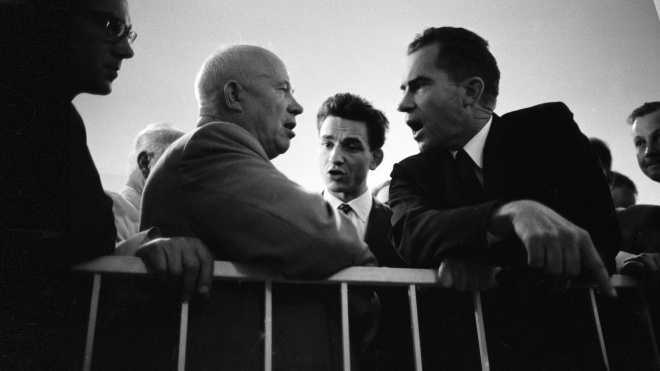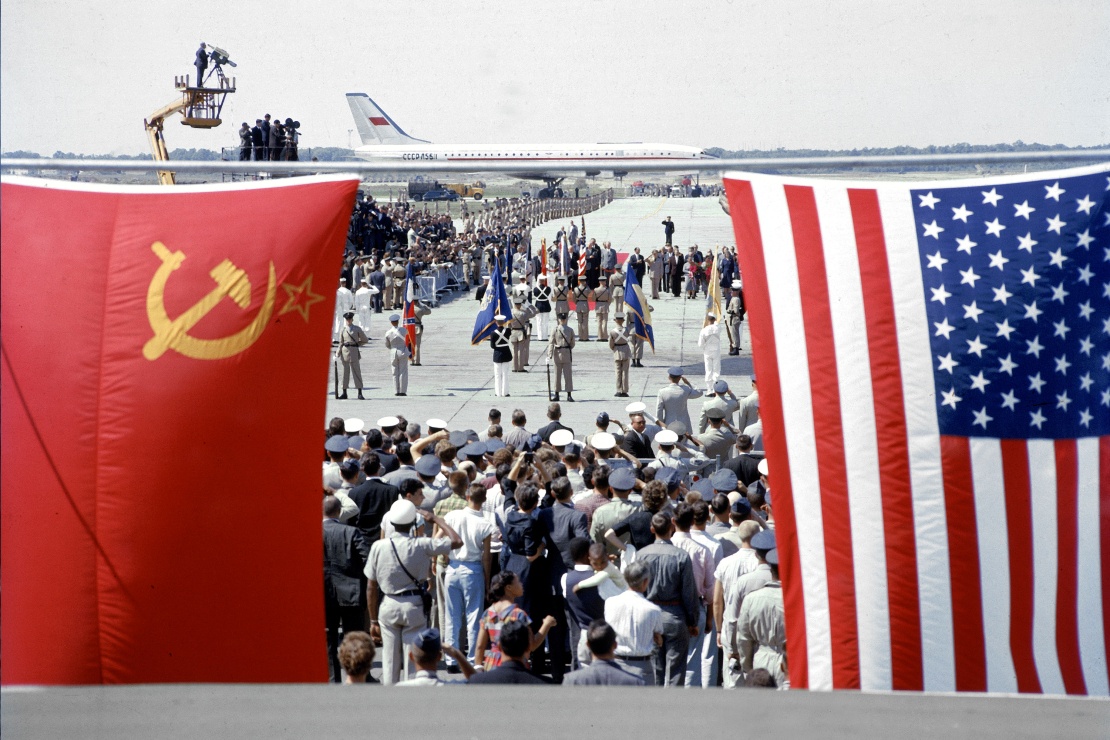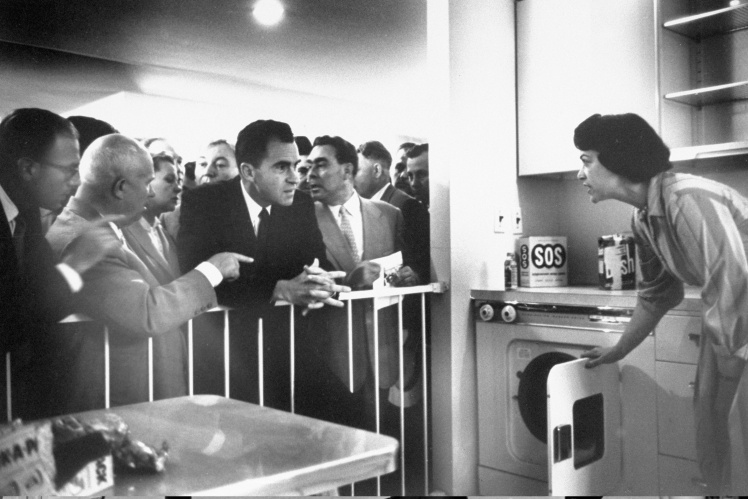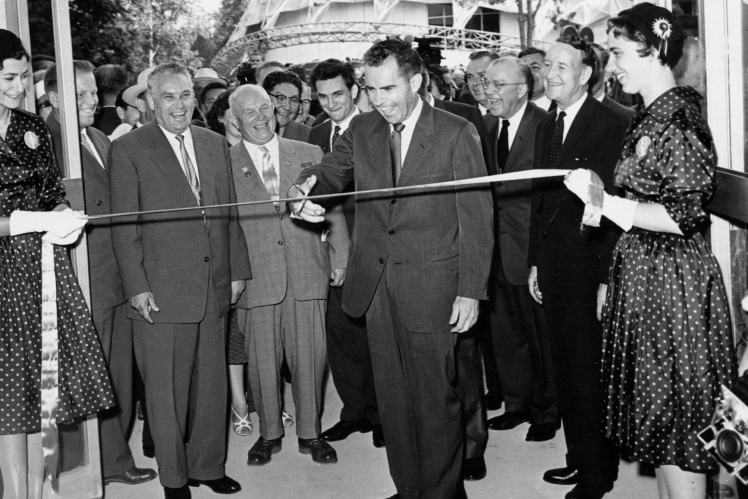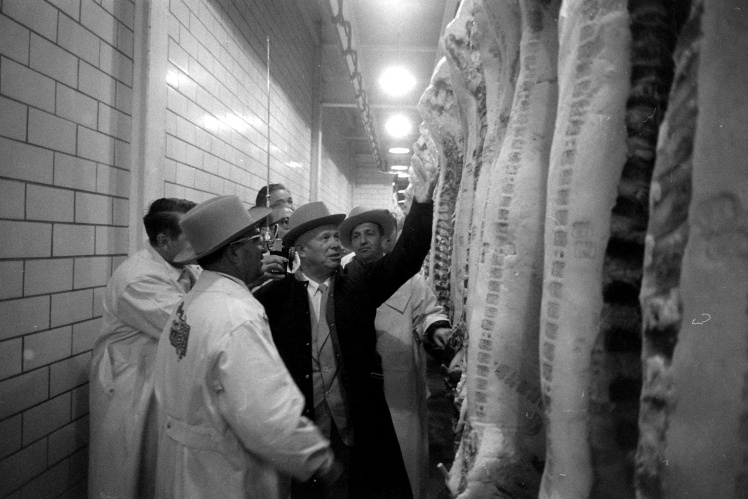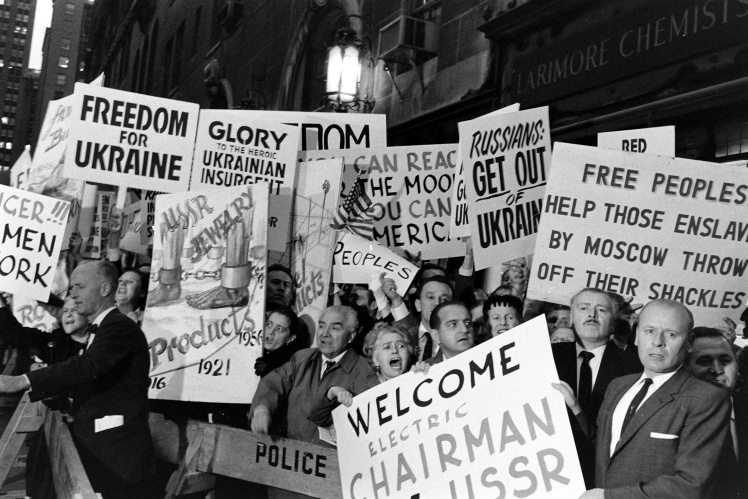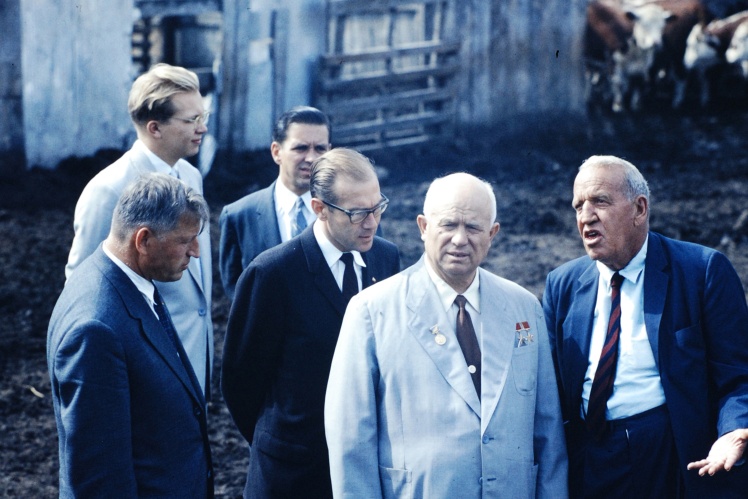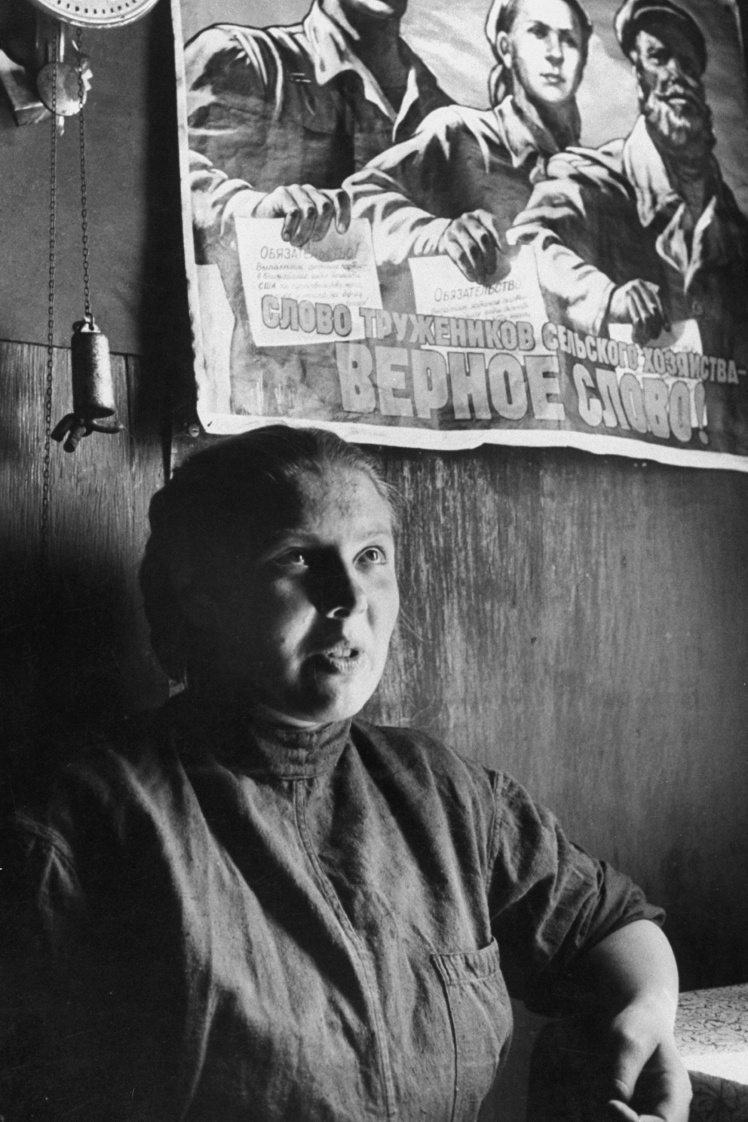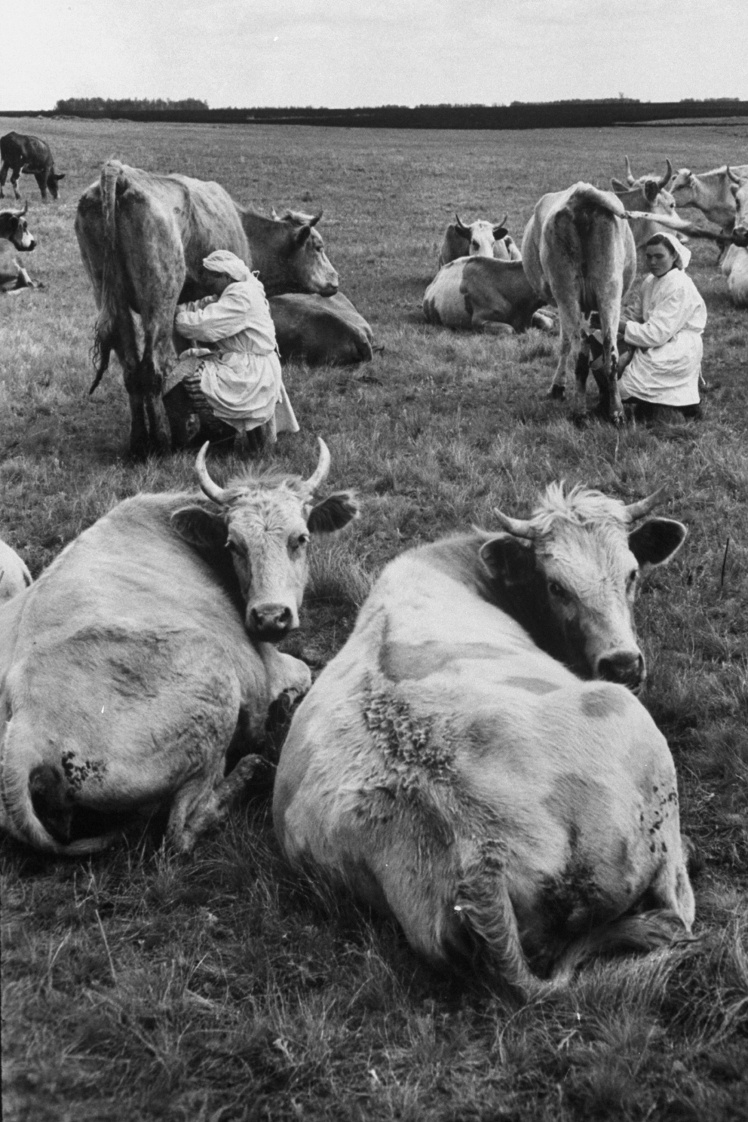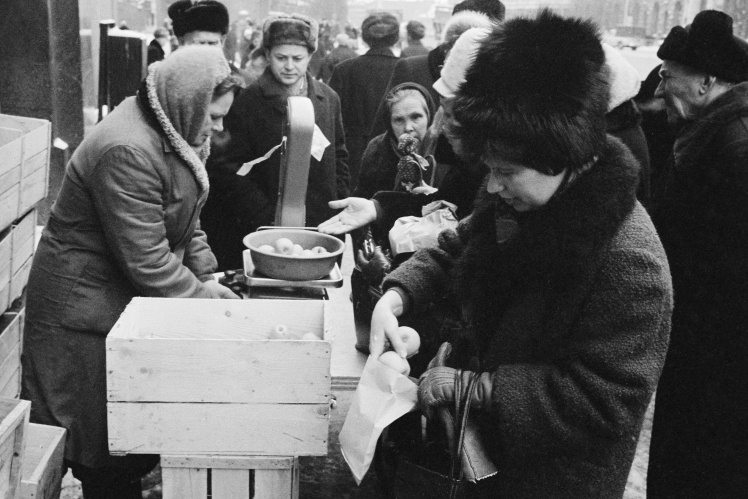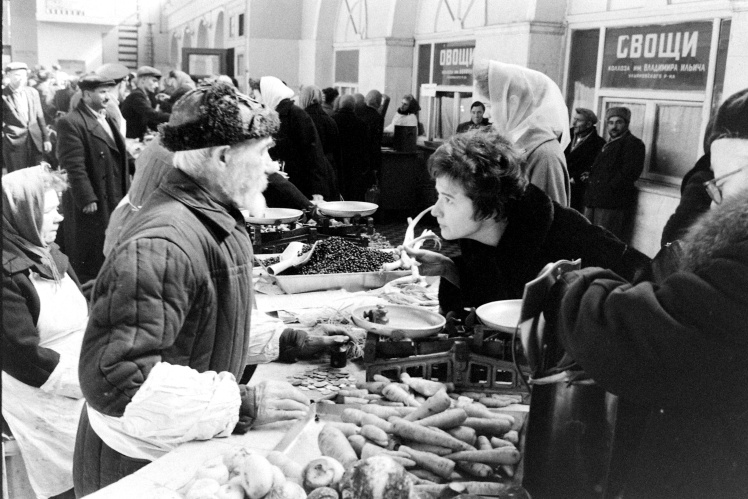Nikita Khrushchevʼs meeting in the USA, September 1959.
The slogan "catch up and overtake" was put forward by the leader of the Bolsheviks, Vladimir Lenin, back in 1917. Though, at that time it concerned not only the USA, but also developed European countries — France, Great Britain, and Germany.
Then this slogan was picked up by Stalin: "We caught up and overtook the advanced capitalist countries in terms of establishing a new political system, the Soviet system. Itʼs good. But this is not enough. In order to achieve the final victory of socialism, it is still necessary to catch up and surpass these countries also in the technical and economic aspect." It got to the point that in the 1930s even male names Dognat and Peregnat appeared.
The USA became the main ideological enemy of the USSR already after the Second World War. In 1953, Nikita Khrushchev became the first secretary of the Central Committee of the Communist Party of the Soviet Union and, in fact, the head of state. He mentioned the old slogan at an agricultural meeting in Leningrad on May 22, 1957. At that time, it was about catching up and surpassing America in the production of meat, butter and milk per capita in three years. In fact, Khrushchev planned to catch up and overtake the USA in all fields.
In the same 1957, the first significant successes came. In August, the Soviet Union successfully tested the worldʼs first intercontinental ballistic missile, and in October it was the first in the world to launch an artificial satellite into Earth orbit.
Electric lamps depicting a satellite, a fountain and Moscow University above photographs of former Soviet leaders during the celebration of the 40th anniversary of the Bolshevik coup (October Revolution), November 1957.
Khrushchev decided that it was time to "rub the noses of the Americans" in other areas as well. Therefore, he agreed with the American President Dwight Eisenhower on the exchange of economic and industrial exhibitions between the countries. Such an idea was met with enthusiasm by the US leadership. "Let the Russians want to have what we have. Let them demand it from their leaders. And let them demand it so loudly that the leaders have to answer them. Then, perhaps, the Russian leaders will want to make their people happier and will transfer some of the resources from the production of weapons to the production of furniture, mixers and prefabricated houses," said Norman Winston, a consultant of the American exhibition.
In the summer of 1959, the then US Vice President Richard Nixon flew to Moscow to open the American exhibition. Khrushchev went to the exhibition with him and constantly argued, proving that everything Soviet was the best. He told Nixon that "Americans have grown old and lost the ability to trade." To which Nixon replied: "And you need goods to trade." Ordinary visitors remembered this day with a free Pepsi-Cola tasting, for which a long line lined up.
Nikita Khrushchev and Richard Nixon taste "Pepsi-Cola" at the American exhibition in Moscow, July 25, 1959.
There also was the "kitchen debate" between Khrushchev and Nixon in Pavilion No. 2, where the interior of a "typical American house" filled with various household appliances — refrigerators, televisions, washing machines and dishwashers — was presented. It was on the variety of goods that Nixon emphasized. To which the Soviet leader sarcastically noted: "Donʼt you have such a machine that would put food in your mouth and push it through?"
During this discussion, Khrushchev uttered a phrase that later became famous: "We will show you Kuzkaʼs mother!" — a phraseologism meaning, basically, “weʼll have you for breakfast”. The translator did not understand the context, so after a long pause he translated it verbatim: "We will show you Kuzkaʼs mother."
Nikita Khrushchev and Richard Nixonʼs "Kitchen debate" at the American Exhibition in Moscow on July 25, 1959. Richard Nixon opens the American exhibition in Moscow on July 25, 1959.
In September 1959, Khrushchev went to the United States to prove the advantages of the socialist system over the capitalist one. In his speeches, he explained that the declared race was of an exclusively peaceful nature, but at the same time he did not forget to brag about Soviet ballistic missiles. At the same time, he promised to surpass the USA in terms of the volume of industry in the next ten years and added that "in agriculture, this task will be solved much earlier."
Nikita Khrushchev at the slaughterhouse during his visit to the USA, September 1959. Protesters on the streets of New York during Nikita Khrushchevʼs visit to the USA, September 1959. Nikita Khrushchev on a farm during a visit to the USA, September 1959.
But in agriculture, the slogan "catch up and overtake America" turned out to be a complete failure. Throughout the history of the USSR, the agricultural sector has always been the most backward. And during Khrushchevʼs rule, a large number of difficult and often adventurous tasks were set in the agricultural sector, which had to be completed in the shortest possible time. What was the "corn campaign" worth in the 1950s and 1960s, when corn was sown wherever it was possible and where it was not possible, regardless of climatic conditions.
Nikita Khrushchev with ears of corn in his hands during a visit to the Stalin collective farm in Stavropol Krai, 1958.
In the economic system of the USSR, the main criterion for success was quantity. Such concepts as quality, labor productivity, cost of production, profit — the norms by which production in capitalist countries was judged — were not taken into account. At the end of 1958, an instruction was sent to all regional committees of the CPSU to "take decisive measures to increase meat production." Planned figures were often taken out of thin air, without regard to the real state of affairs and possibilities.
Oleksiy Larionov, the first secretary of the Ryazan regional committee of the CPSU, was especially "distinguished". In early 1959, he promised to triple state meat procurement in the region within a year. Already for one promise, the region received the Order of Lenin in advance, and Larionov — the star of the Hero of Socialist Labor.
A Soviet collective farm worker sits under a campaign poster, 1958. Soviet collective farm women milking cows, 1958.
In order to fulfill the promise, the secretary of the regional committee ordered to slaughter all livestock, dairy cows, to lend "on receipt" all the livestock raised by collective farmers on their farms. Livestock was bought in neighboring regions at the expense of funds allocated for the purchase of equipment, construction of schools and other needs. But this was still not enough. Then Larionov simply added the missing 50 tons of meat to the report and reported on the 100% implementation of the plan.
Agricultural machinery in collective farms was still in short supply, Tver region, July 1954.
However, already in the following year, it became clear that this turned into a disaster for animal husbandry and a shortage of meat in the region. In the end, Larionov was stripped of all awards and ranks, and in September 1960, according to the official version, he died of a heart attack, and according to the unofficial version, he shot himself.
This happened all over the country. Therefore, in the early 1960s, when Khrushchev was proud that the USSR was the first to send a man into space, a food crisis began in the country. Already in 1962, the government was forced to raise retail prices for products. And in the following year, due to the drought, there was a crop failure, which led to a shortage of bread.
Wheat threshing in the state farm in Akmolinsk, 1958.
Meat, milk, and butter, the rates of production of which by this time the Soviet Union should have overtaken the United States, have practically disappeared from the market. Other products were also in short supply. "I talked to the workers. They say: there are no onions, we have scurvy. Well, how can it be that there is no onion? And our prices have increased tenfold for this little thing. Well, what a shame? There is socialism, but there are no onions, no dill, no potatoes," Khrushchev complained at the Presidium of the Central Committee in September 1963.
In the end, the USSR had to buy food even from the USA. And in the following year, Khrushchevʼs closest allies from the top of the party arranged a conspiracy and removed him from power.
The queue for apples in Moscow, 1965. Market in Moscow, 1963.
Translated from Ukrainian by Anton Semyzhenko.
Your donations will help us catch up and overtake other media: 🔸 Buy Me a Coffee, 🔸 Patreon, 🔸 PayPal: [email protected].
